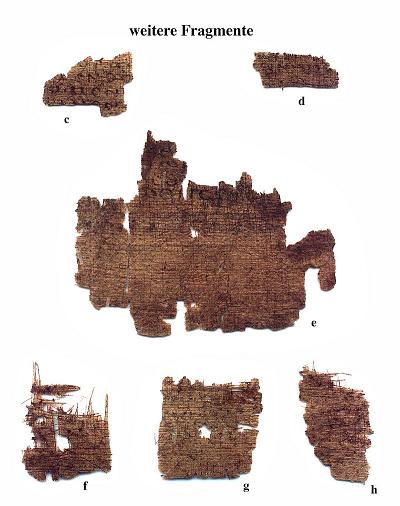| Change to Book/Chapter View |
|
|
|
Translation process is ongoing. For current status see details |
|
|

Papyrus 40 Discovered: Near Qarara, Egypt in 1914 Location: Heidelberg, Germany; Institut für Papyrologie der Universität Contents: Romans 1:24-27, 1:31-2:3, 3:21-4:8, 6:2-5, 14-16; 9:17, 27
Romans 1 24 Therefore God also gave them up in the lusts of their hearts to uncleanness, that their bodies should be dishonored among themselves; 25 who exchanged the truth of God for a lie, and worshiped and served the creature rather than the Creator, who is blessed forever. Amen. 26 For this reason, God gave them up to vile passions. For their women changed the natural function into that which is against nature. 27 Likewise also the men, leaving the natural function of the woman, burned in their lust toward one another, men doing what is inappropriate with men, and receiving in themselves the due penalty of their error. [..] 31 without understanding, covenant breakers, without natural affection, unforgiving, unmerciful; 32 who, knowing the ordinance of God, that those who practice such things are worthy of death, not only do the same, but also approve of those who practice them.
Romans 2 Therefore you are without excuse, O man, whoever you are who judge. For in that which you judge another, you condemn yourself. For you who judge practice the same things. 2 We know that the judgment of God is according to truth against those who practice such things. 3 Do you think this, O man who judges those who practice such things, and do the same, that you will escape the judgment of God? [..]
Romans 3 21 But
now apart from the law,
a righteousness of God has been revealed, being testified
by the law and the prophets; 22 even the righteousness of
God through faith in Jesus Christ to all
27 Where
then is the boasting? It is excluded.
By what kind of law? Of works? No,
but by a law of faith. 28 We maintain therefore that a man is justified by faith apart from the works of the law. 29 Or
is God the God of Jews only? Isn’t he
the God of Gentiles also? Yes, of
Gentiles also, 30 since
indeed there is one God who will justify the
circumcised by faith, and the uncircumcised through faith. 31 May it never be! No, we establish the law.
Romans 4 What then will we say
that Abraham, 7 “Blessed are they whose iniquities are forgiven,
Romans 6 2 May it never be! We who died to sin, how could we live in it any longer? 3 Or don’t you know that all we who were baptized into Christ Jesus were baptized into his death? 4 We were buried therefore with him through baptism into death, that just as Christ was raised from the dead through the glory of the Father, so we also might walk in newness of life. 5 For if we have become united with him in the likeness of his death, we will also be part of his resurrection; [..] 14 For sin will not have dominion over you. For you are not under law, but under grace. 15 What then? Shall we sin, because we are not under law, but under grace? May it never be! 16 Don’t you know that when you present yourselves as servants and obey someone, you are the servants of whomever you obey; whether of sin to death, or of obedience to righteousness? [..]
Romans 9 17 For the Scripture says to Pharaoh, “For this very purpose I caused you to be raised up, that I might show in you my power, and that my name might be proclaimed in all the earth.” [..] 27 Isaiah cries concerning Israel, “If the number of the
children of Israel are as the sand of the sea,
[1] The manuscript matches the critical text. [2] This is a well-known type of scribal error. The scribe looked at the end of the end of verse 30, which ends in the word “faith,” then skipped the next sentence that also ends in the word “faith,” accidentally leaving it out. [3] This is the same well-known type of scribal error as on 3:31. This time the scribe saw a line ending in “righteousness” (end of verse 5) and skipped the next line ending in “righteousness.” |
How to read these pages: • The
translation to the left is based on the World English Bible. Words in regular
black font are words in the manuscript matching the Majority Text for that
passage. • Words
in italics cannot be seen in the manuscript, since the manuscript is
fragmentary. These words are supplied for readability by the World English
Bible translation. • Words
present in the manuscript but with some letters unreadable or missing are in blue
like this: blue. One Greek word often is
translated into multiple English words, and when this occurs, all the English
words are in blue. • Words
present in the manuscript but with spelling or trivial word order differences that do not affect the
meaning are in green like this: green. • If
the manuscript is different from the Majority Text, words in the Majority
Text that are missing from the text of the manuscript are marked through in red
like this: • If the manuscript is different from the Majority Text, words in the manuscript that are not in the Majority Text are underlined in red like this: new words.If the manuscript differs from the Majority Text yet matches another well-known text, this is noted in the footnotes.
|
